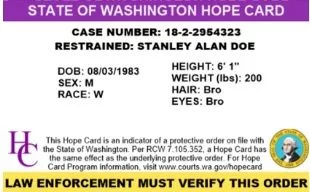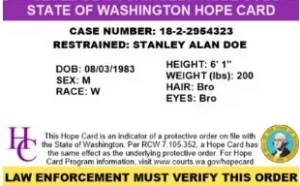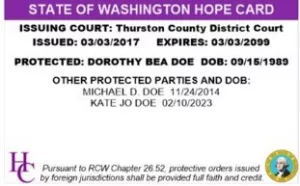
OLYMPIA, WA – Washington State officials will hold a press conference Thursday morning to discuss the launch of a new resource for victims of domestic violence. The Hope Card program officially began January 1st and will give survivors a wallet-sized portable copy of their protection order, similar to a driver’s license, that they can quickly show to law enforcement, employers, school officials, and landlords if an abuser is violating an order.
In 2023, nearly 15,000 abusers violated domestic violence protection and no contact orders in Washington State. The violations threaten the lives of survivors and extend their trauma.
The card includes all the information law enforcement needs to verify the protection order if a potential violation occurs, including the following:
- The name of the person restrained and their identifying information
- The names of the persons protected
- The protection order case number and issuing court
- The protection order’s issuance and expiration dates
A Hope Card is not a substitute for a protection order, and you must already have a full protection order to request a Hope Card.
The press conference covering the launch of Washington’s Hope Card Program is set for Thursday between 12:30 p.m. and 1:30 p.m. It will be livestreamed on TVW.
Hope Cards are completely free and available to anyone with the following types of valid full civil protection orders: Domestic Violence, Sexual Assault, Stalking, Vulnerable Adult, and Anti-Harassment Protection Orders.
The press conference is a collaborative effort between the legislators who initially sponsored the bill and the AOC who administers the program.


From Washington State Courts:
“This is about prioritizing survivors and keeping them safe. The bulky legal-size documents survivors are currently required to carry to prove they have a protection order are cumbersome and challenging,” said Rep. Dan Griffey, (R-Allyn) the sponsor of the 2023 bill that created the Hope Card. “Survivors already have enough to worry about, and sadly the system favors the abuser. The Hope Card is one way we change that.”
“There is hope after domestic violence. I am living proof,” said Rep. Lauren Davis, (D-Shoreline) who co-sponsored the bill and will be a Hope Card recipient. “Protection orders can be effective, but they only work if they are enforced. In fact, failure to hold a perpetrator accountable for a violation increases the lethality risk for a victim. Repeated violations of an order are an indicator of stalking, which is highly correlated with intimate partner homicide. The Hope Card program will help ensure that abusers are held accountable and that protection orders actually provide the safety that the state promises when they are issued. I am honored to partner with my friend and colleague, Rep. Griffey, in this work, and I am deeply grateful for his leadership.”
Hope Cards are free and can be used until your protection order expires, is dismissed, or is modified. Cards are available to anyone with these types of valid full civil protection orders:
- Domestic Violence Protection Order (DVPO)
- Sexual Assault Protection Order (SAPO)
- Stalking Protection Order (SPO)
- Vulnerable Adult Protection Order (VAPO)
- Anti-Harassment Protection Order (AHPO)
Hope Cards cannot be issued for Temporary Protection Orders. Protection orders must be past temporary status before cards can be issued. Additionally, Hope Cards cannot be issued for No-Contact Orders (NCO) in a criminal case, Extreme Risk Protection Orders (ERPO), nor Restraining Orders.
Please note that requesting a Hope Card is not the same as applying for a protection order. You must first apply for and receive a valid, full protection order to be able to request a Hope Card.

